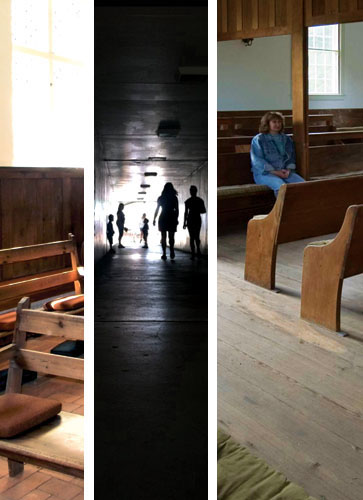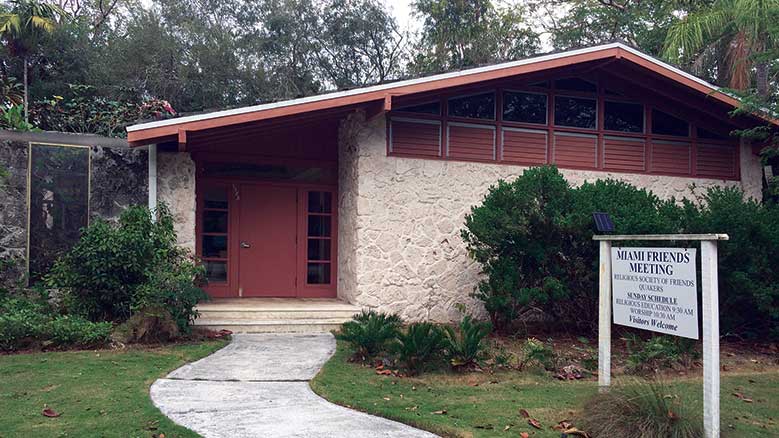To understand the Friendly testimonies, including equality, simplicity, and community, it is important to get to know some of the societies that have developed to put these ideals into daily practice, and the struggles that have developed to defend these societies. I’d like to tell you about some of them; I’ve been a wandering student of life for almost three years, hitchhiking from place to place and squatting.
Squatters take over abandoned buildings and use recycled and scavenged materials to renovate them and to turn them into communal homes. In Europe, large squatted buildings become social centers, hosting public libraries; street kitchens; public computer labs; craft workshops; concert halls; mural spaces for graffiti artists; "bicycle libraries"; "free shops" providing discarded clothing and household items; experiments in sustainable technology; and common sleeping areas for passing travelers. Community gardens and orchards sprout up in the vacant lots surrounding squats. These projects are not maintained with paid staff or grant funding, by charging fees for services, or through charity; instead, they function with the active participation and contributions of all who use the facilities, and by gathering resources from dumpsters. Since squatters do not pay rent, their energies are freed for community engagements such as child care and elder care, grassroots legal aid networks, workshops in alternative medicine and environmental education, and community media.
Squatting as a political movement posits "property of use"—that land belongs to those who need it and use it—against the traditional conception of private property, and posits that human beings have a greater right to land than real estate companies do. Most U.S. states have, until the past several decades, historically accorded ownership rights to the squatters (also called "settlers" and "homesteaders") who have lived on and developed land that they have not bought. "Property of use" has also been one of the guiding principles behind Latin American and African agrarian reform laws to break up large plantations following decolonization. It’s an old idea: the first Christians rejected private property altogether and pooled their resources to live in common (Acts 4:32-5:10).
Squatting, in a more general sense, is the appropriation of physical and virtual space to make room to create alternatives to the status quo, and, often, to make one’s presence and demands known to the authorities "responsible" for that space. This reclamation of corporate and public space for human use is re-flected in many diverse forms of activism such as pirate radio, landless peasants’ subsistence farming movements, "subvertising," parody websites (such as gatt.org and nato.org), rent strikes, protest street blockading, and sit-ins.
Squatting is also a movement of necessity. Across Europe and the United States, factories and investors have pulled out of industrial cities, relocating in search of cheaper labor and lower environmental standards, leaving empty industrial buildings: urban brownfields. White flight to the outlying small towns and to outer-ring suburbs has also left abandoned housing in the inner cities and inner-ring suburbs; Philadelphia, for example, has 30,000 abandoned homes, and at least 25,000 homeless residents, according to housing activists. Fire- and water-damaged houses stand vacant for years, either abandoned or bought cheaply by speculators who sit on them, waiting to resell them for higher prices later. As the houses decay, they pose safety, fire, and health risks to the rest of the neighborhood. As municipalities try to replace their lost industry with tourism, developers do not attempt to rehabilitate existing housing.
Instead, poor neighborhoods are systematically demolished in the name of "urban re-newal" as corporate-municipal "partnerships" construct new highways, chain stores that force out local businesses, and upscale housing and hotels that local residents cannot afford. Meanwhile, homeless families sleep on the streets, hoping not to be arrested under new "quality of life" and "daily security" laws that across Europe and the United States have made it a crime to use sidewalks to sleep, sit, eat, chat, play music, panhandle, trade, leaflet, protest, play, or do any of the activities that bring life to streets. Families’ homes are seized via eminent domain, and residents are evicted as rents rise and neighborhoods are gentrified. Last year, I asked some Philadelphia drug dealers what it would take to end Philadelphia’s drug trade. They answered, "free housing": underemployed youth sell drugs to house their families.
Squatters often try to legalize their squat, usually by seeking a contract with the house’s owner or with the city. When legal negotiations fail and eviction is threatened, residents and supporters sometimes gather inside houses, holding festivals and refusing to leave. In Barcelona, two social centers were successfully defended when residents wearing harnesses suspended themselves from the roofs, hanging there for four days, protecting the houses with their bodies. Across Europe and North America, squats have in recent years been met with increasingly harsh repression including home raids, beatings, deportations, tear gas, fines, and prison time. During a recent wave of evictions in Brussels, police incinerated all the squatters’ clothes, identity papers, and possessions; the justification was lice risk. In Europe, arson and physical assault by right-wing groups are also a constant threat for squats. Currently, the solidification of the European Union has meant the concerted evictions of the longest-established social centers, in almost every city in Europe.
Despite these evictions, new squats are opened every day, in defense of Article 25 of the Universal Declaration of Human Rights: "food, clothing, housing and medical care and necessary social services." As governments abandon their responsibility to protect such rights, grassroots movements build community at the local level to re-weave this world’s ripped social safety net with mutual aid and solidarity, in every neighborhood, every day.
For more information on housing rights, see the Poor People’s Economic Human Rights Campaign, http://www.kwru.org; the Movimento Sim Terra, http://www.mstbrazil.org; ACORN, http://www.acorn.org; and the squat network, http://www.squat.net.



